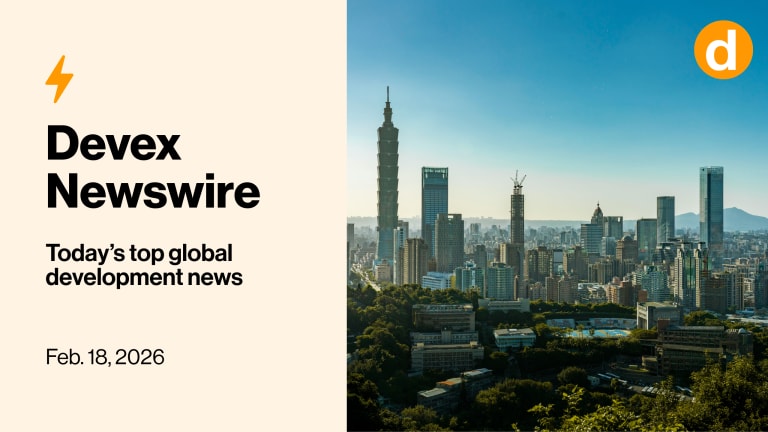
The Deputy Director General of the World Trade Organization Yonov Frederick Agah cautioned that his organization was taking a wait and see approach as several countries adopt policies that threaten to turn away from open trade relationships and treaties.
“The WTO is a member-driven organization and the organization itself doesn’t make decisions or policies, the members do,” he told Devex Wednesday at the World Economic Forum on Africa.
“Overall all the interactions between members in the WTO have been under certain circumstances of uncertainty — whether this is political, economic, has to do with different levels of development or different priorities,” Agah added.
Ultimately it is up to individual countries through their domestic processes to set their priorities and a multilateral organization cannot do that for them, he said. And so it is possible for a country to leave the WTO, but he questioned what it would take to rejoin the organization.
See more stories from the World Economic Forum on Africa in Durban:
► African leadership and priorities debated in opening of WEF Africa
► NEPAD reprioritizes focus on intra-African trade via regional transport corridors
► Should Africa 'hurry up and wait' amid development crisis?
“Whichever policy path a country takes I believe the legal frameworks in the WTO are strong enough for the members to find ways, whether it’s negotiating new rules or whether ensuring binding commitments are taken on board by all members,” Agah said. “We wait and see.”
That doesn’t mean there isn’t work being done today. In February the WTO’s Trade Facilitation Agreement went into force and so now the period of implementation by countries has begun. And it doesn’t mean that Agah is any less certain in the power of trade as a tool for economic development and growth.
Most of the gains toward poverty alleviation achieved under the Millennium Development Goals, were driven by trade, with India and China as notable examples, he said.
Any country that wants to use trade as a development policy tool needs to look at the issues specific to the country — the politics, economy, demographics and geography — and determine what the needs are and what makes sense. Then countries can look at markets, see what they can produce, evaluate technology needs, and look to improve supply chain logistics, Agah said. Trade policy should be embedded in development policy, but no two policies are likely to look alike given each country’s particular needs.
“The role of trade in development has always been controversial because the benefits from trade are not shared equally amongst countries,” Agah said, but countries can use trade to make economic progress and get out of poverty.
But in order for that to happen businesses need to be part of the conversation and share case studies of what has worked to help inform national debates that can then translate to policies at the multinational level, he said.
Agah acknowledged that trade policy, like any government policy, is likely to have beneficiaries and losers. What governments must do is have a conversation that identifies who is losing and then put in place measures to minimize the losses and help those adversely affected, he said.
“My own perspective is when government focuses on creating champions, success stories and forgets about those who have not been able to respond to those challenges over time, you get into the kind of situation where you hear the other voices of people being left behind. But provided you put trade policy first and you look at the other complementary policies — social policy, income policy — that help you create inclusive society you are fine.” he said.
And that growth isn’t limited to middle income countries; as Afghanistan’s accession to the WTO demonstrated last year, conflict-riven countries can still make trade a priority. The challenge is to get those trade policies incorporated into the development policies — even though both data and economic history shows that trade can play a big role in a country’s development even when emerging from conflict, natural or health disaster, Agah said.
For everything you need to know about the World Economic Forum on Africa, follow our coverage this week and join the conversation on Africa's future. Follow @devex and tag #WEFAfrica2017
Search for articles
Most Read
- 1
- 2
- 3
- 4
- 5








